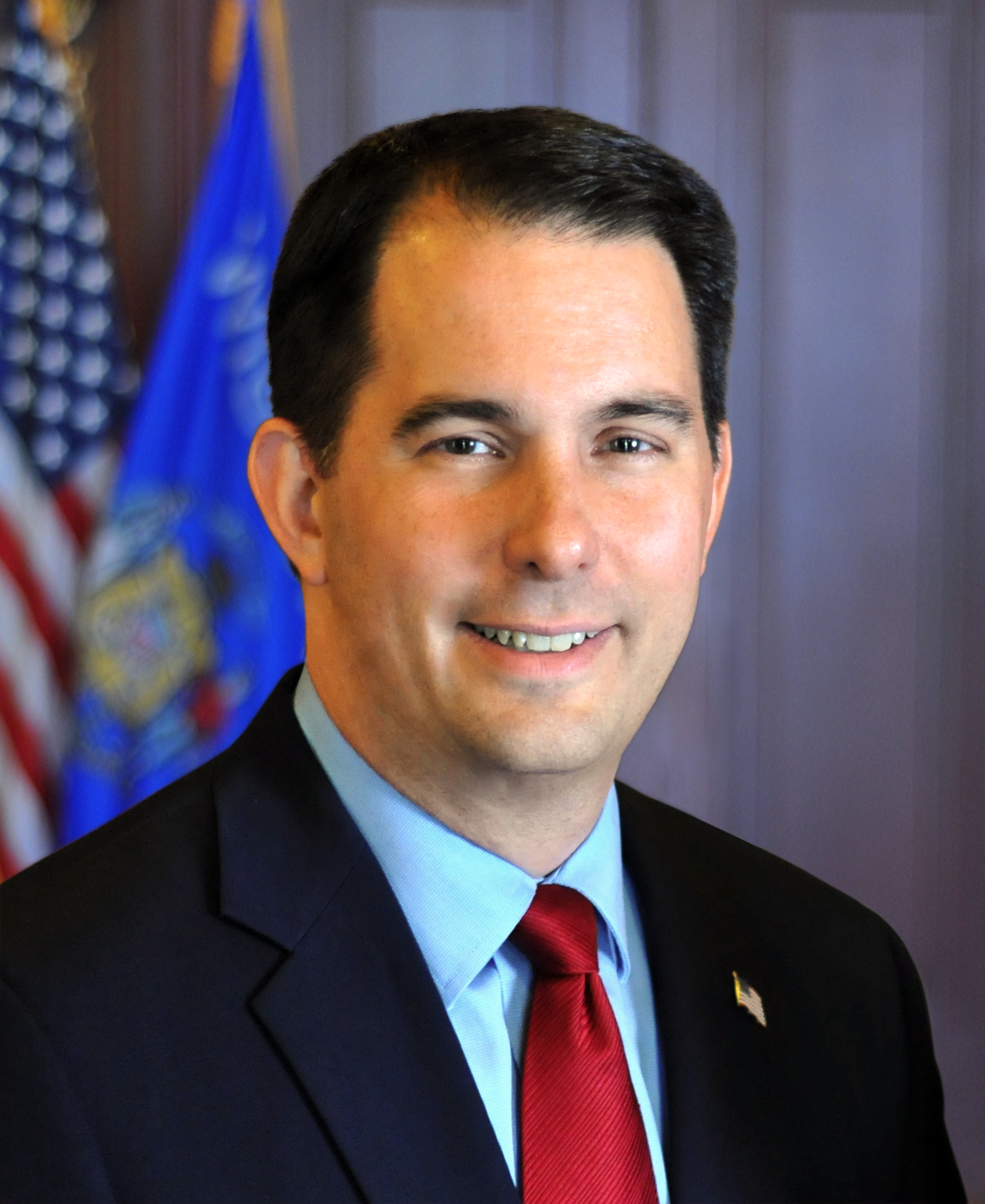Governor Scott Walker Signs 49 Bills Into Law
Governor Scott Walker signed 49 bills into law today at the Wisconsin State Capitol.
Madison – Governor Scott Walker signed 49 bills into law today at the Wisconsin State Capitol.
Senate Bill 81 – limits the authority of political subdivisisions to create new occupational licenses or fees. Under current law, a political subdivision may regulate certain professions, and this bill makes it so that political subdivisions cannot impose occupational fees or licensing requirements if the political subdivision is not currently imposing occupational fees or licensing requirements. Authored by Senator Van Wanggaard (R – Racine) and Representative Dale Kooyenga (R – Brookfield), the bill passed the Senate on a voice vote and was concurred by the Assembly by a vote of 56-34. It is Act 65.
Senate Bill 126 – includes “equine-assisted learning” and “equine-assisted psychotherapy” within the definition of “equine activities,” and extends civil liability ammunity protections that most equine-related activities enjoy to these new treatments. Authored by Senator Van Wanggaard (R – Racine) and Representative Chris Kapenga (R – Delafield), the bill passed the Senate on a voice vote and was concurred by the Assembly on a voice vote. It is Act 66.
Assembly Bill 75 – allows military personnel who are stationed in Wisconsin for at least one year to apply for a Concealed Carry Permit for the duration of their stay. Under current law, the Department of Justice (DOJ) may not issue a license to carry a concealed weapon to an applicant who is not a resident of Wisconsin. This bill creates a licensing exception for an applicant who is stationed in Wisconsin for at least one year while in active service in the U.S. armed forces and is otherwise qualified. Authored by Representative Joel Kleefisch (R – Oconomowoc) and Senator Van Wanggaard (R – Racine), the bill passed the Assembly by a vote of 91–8 and was concurred by the Senate on a voice vote. It is Act 67.
Assembly Bill 77 – provides that any former law enforcement officer, who is now a Wisconsin resident, but was employed by a law enforcement agency outside of Wisconsin, can apply for an HR218 federal license to carry a concealed weapon through the Department of Justice (DOJ). An HR218 license is a federal concealed carry permit that is issued to former law enforcement officers, and unlike a normal Wisconsin concealed carry license, an HR218 card is valid in all 50 states, requires annual qualification, and is only valid for handguns. Authored by Representative Joel Kleefisch (R – Oconomowoc) and Senator Janet Bewley (D – Ashland), the bill passed the Assembly by a vote of 89-10 and was concurred by the Senate on a voice vote. It is Act 68.
Assembly Bill 443 – changes publication requirements for the Wisconsin Supreme Court when it wishes to promulgate a new rule or make changes to an existing rule. The bill continues to require notice of a public hearing to be published three times in the newspaper, but the full text of the rule is not required to be included. Instead, the full text will be published on the court system’s website. Authored by Representative Tyler Vorpagel (R – Plymouth) and Senator Van Wanggaard (R – Racine), the bill passed the Assembly on a voice vote and was concurred by the Senate on a voice vote. It is Act 69.
Assembly Bill 74 – authorizes commercial driver training schools and instructors, which are currently licensed and regulated by the Department of Transportation (DOT), to provide online driver training instruction in addition to providing instruction in a classroom. If the driver school also offers behind-the-wheel instruction in Wisconsin, the online driver training instruction can be provided as an alternative to classroom instruction. Authored by Representative Keith Ripp (R – Lodi) and Senator Luther Olsen (R – Ripon), the bill passed the Assembly on a voice vote and was concurred by the Senate on a voice vote. It is Act 70.
Senate Bill 254 – clarifies that the Achievement Gap Reduction (AGR) contracts must require school boards to implement one or more of the three statutorily defined strategies in each class in each participating grade at each participating school. The bill also delays annual evaluations of the AGR program by one year. Authored by Senator Luther Olsen (R – Ripon) and Representative Mary Czaja (R – Irma), the bill passed the Senate on a voice vote and was concurred by the Assembly on a voice vote. It is Act 71.
Assembly Bill 332 – creates an exception to the pupil participation limit in the Wisconsin Parental Choice Program and corrects a flaw in the new expansion of the program. In the 2015-17 budget, the student participation cap is removed in 2016-17 and replaced with a limit that no more than 1 percent of the district’s prior year membership could participate in the program. This created a problem for a small number of students currently attending a private school using a voucher – the students would be forced out of the program because their resident district would exceed the new 1 percent limit. This bill grandfathers this group into the program, and the exception allows a pupil who attended a private school under the statewide parental choice program in the previous year to attend a private school under the program if the pupil’s application to attend a private school under the program is not accepted because the pupil’s resident school district has exceeded its pupil participation limit. Authored by Representative Joe Sanfelippo (R – New Berlin) and Senator Duey Stroebel (R – Saukville), the bill passed the Assembly on a voice vote and was concurred by the Senate on a voice vote. It is Act 72.
Assembly Bill 322 – authorizes the Department of Transportation (DOT) and local authorities to allow the parking of motor vehicles owned by carsharing organizations on a highway in a zone where the time of parking is limited by official signs, markers, or parking meters, regardless of the time limits posted. The bill allows for the creation of a new alternative transportation option for Wisconsin’s communities. Authored by Representative Tyler August (R – Lake Geneva) and Senator Jerry Petrowski (R – Marathon), the bill passed the Assembly on a voice vote and was concurred by the Senate on a voice vote. It is Act 73.
Assembly Bill 205 – clarifies that vehicular traffic facing a flashing yellow arrow traffic control signal may enter the intersection without stopping after yielding to other traffic lawfully in the intersection. Under current law, vehicular traffic facing a flashing yellow traffic control signal may enter the intersection with caution. This bill provides additional safety for the traveling public and helps to improve traffic efficiency. Authored by Representative Tyler Vorpagel (R – Plymouth) and Senator Jerry Petrowski (R – Marathon), the bill passed the Assembly on a voice vote and was concurred by the Senate on a voice vote. It is Act 74.
Assembly Bill 344 – lengthens the time period during which tax increments may be allocated and expenditures for project costs may be made for Tax Incremental District (TID) Number One in the Village of Weston. This bill provides the Village of Weston with the flexibility to refinance their project costs so their increment covers those costs. The bill also allows them to eliminate the financial hardship the TID currently faces. Authored by Representative John Spiros (R – Marshfield) and Senator Jerry Petrowski (R – Marathon), the bill passed the Assembly on a voice vote and was concurred by the Senate by a vote of 32-0. It is Act 75.
Assembly Bill 158 – eliminates obsolete natural resources administrative code regarding pollution and sewer overflow abatement as well as financial assistance to wastewater treatment systems. The Department of Safety and Professional Services (DSPS) now administers programs formerly administered by the Department of Natural Resources(DNR) and has its own administrative code, so this bill simplifies administrative code by repealing rules related to programs that are no longer in operation. Authored by Representative James Edming (R – Glen Flora) and Senator Jerry Petrowski (R – Marathon), the bill passed the Assembly on a voice vote and was concurred by the Senate on a voice vote. It is Act 76.
Assembly Bill 208 – removes the requirement under current law for the Department of Transportation (DOT) to issue a special restrictions card to a person that describes all of the special restrictions their operator’s license is subject to. Under current law, DOT may, upon issuing a motor vehicle operator’s license, impose operating restrictions related to the licensee’s ability to operate a motor vehicle safely. This bill eliminates the need for a driver to retain multiple cards if the driver has multiple restrictions. Authored by Representative Joel Kitchens (R – Sturgeon Bay) and Senator Jerry Petrowski (R – Marathon), the bill passed the Assembly on a voice vote and was concurred by the Senate on a voice vote. It is Act 77.
Senate Bill 117 – extends protections from harm and threat of harm that currently apply to judges, members of his or her family, and law enforcement officers to include the families of law enforcement officers as well as prosecutors and their families. This bill also makes it a felony for a person to intentionally cause or threaten harm to a judge, prosecutor, law enforcement officer, or their family members. An amendment to the bill also extends those protections to former officials as well. Authored by Senator Rick Gudex (R – Fond du Lac) and Representative Jim Ott (R – Mequon), the bill passed the Senate on a voice vote and was concurred by the Assembly by a vote of 80-16. It is Act 78.
Senate Bill 137 – allows municipalities to post public legal notices in one public place and their internet site rather than three public places. This bill provides municipalities additional flexibility in complying with open meeting requirements. Authored by Senator Howard Marklein (R – Spring Green) and Representative John Spiros (R – Marshfield), the bill passed the Senate on a voice vote and was concurred by the Assembly on a voice vote. It is Act 79.
Assembly Bill 8 – creates an additional crime of invasion of privacy for an individual who knowingly installs or uses a device to intentionally view, broadcast, or record under the outer clothing of another individual; or to view another body part of an individual that is not otherwise visible without that individuals’ consent. Under current law, the crime of invasion of privacy is a Class A misdemeanor. This bill specifically prohibits such activity and makes it punishable as a Class I felony. Authored by Representative Jim Ott (R – Mequon) and Senator Alberta Darling (R – River Hills), the bill passed the Assembly on a voice vote and was concurred by the Senate on a voice vote. It is Act 80.
Assembly Bill 7 – codifies the Supreme Court’s decision that a lesser-included offense for criminal homicide includes a crime that may be charged under subch. I of ch.9 40, Stats., making those a less serious type of criminal homicide than the one charged. Authored by Representative Jim Ott (R – Mequon), the bill passed the Assembly on a voice vote and was concurred by the Senate on a voice vote. It is Act 81.
Senate Bill 173 – places Wisconsin back into compliance with federal regulations, thus providing more uniform child support rules and allowing Wisconsin to continue receiving federal funding for Temporary Assistance for Needy Families (TANF) and child support. The bill also creates uniform, simple, and inexpensive procedures for the establishment, recognition, and enforcement of child support and family maintenance. Authored by Senator Robert Cowles (R – Green Bay) and Representative David Heaton (R – Wausau), the bill passed the Senate on a voice vote and was concurred by the Assembly on a voice vote. It is Act 82.
Senate Bill 210 – permits an out of state emergency medical services (EMS) provider without a Wisconsin license, training permit, or certificate to act as an ambulance service provider, first responder, or emergency medical technician (EMT) in Wisconsin so long as the provider holds a valid license, training permit, certificate or other credential allowing the person to act as an ambulance service provider, first responder, or EMT in another state; and is acting in response to a request for mutual aid and responding from the state in which that person holds the appropriate credentials to act as an ambulance service provider, first responder, or EMT. Authored by Senator Sheila Harsdorf (R – River Falls) and Representative Warren Petryk (R – Eleva), the bill passed the Senate on a voice vote and was concurred by the Assembly on a voice vote. It is Act 83.
Assembly Bill 405 – eliminates income tax liability, licensing requirements, use tax liability, and sales tax reporting requirements for individuals or businesses that come from out-of-state to do repair work on infrastructure following a disaster declaration by the Governor. These exemptions are only available for the work that is performed during a state of emergency declared by the Governor, or within ten days before or 60 days after that state of emergency declaration. Authored by Representative Warren Petryk (R – Eleva) and Senator Howard Marklein (R – Spring Green), the bill passed the Assembly on a voice vote and was concurred by the Senate by a vote of 32-0. It is Act 84.
Assembly Bill 418 – extends the appropriations for winding up the affairs of the state Health Insurance Risk Sharing Plan (HIRSP) by one year in order to allow OCI to distribute the unexpected $1.8 million in receivables from HIRSP to those who contributed to the surplus, including policyholders, insurers, and medical providers. Authored by Representative Warren Petryk (R – Eleva) and Senator Leah Vukmir (R – Wauwatosa), the bill passed the Assembly by a vote of 97-0 and was concurred by the Senate by a vote of 32-0. It is Act 85.
Assembly Bill 416 – implements several changes to Unemployment Insurance law, including changing the definition of Wisconsin employer, extending the Tax Intercept Program (TOP) to businesses, and provide that an individual in a workshare program only receives the workshare benefit. Authored by Representative Daniel Knodl (R – Germantown) and Senator Stephen Nass (R – Whitewater), the bill passed the Assembly on a voice vote and was concurred by the Senate on a voice vote. It is Act 86.
Assembly Bill 392 – allows for a cooperative to vote electronically if the by-laws of the co-op allow electronic voting, the co-op can authenticate the votes, and the co-op assigns the same value to an electronic vote that it does a traditional vote. The bill streamlines the voting methods for cooperatives and allows members of a co-op to more actively participate. Authored by Representative Adam Jarchow (R – Balsam Lake) and Senator Terry Moulton (R – Chippewa Falls), the bill passed the Assembly on a voice vote and was concurred by the Senate on a voice vote. It is Act 87.
Assembly Bill 324 – updates the name of the retail alcohol licensee in Chippewa Falls, which changed from Wisconsin Renaissance Faire to Eagle Ridge Festival Grounds. The bill additionally maintains the exception to allow an unaccompanied underage person to enter or be on that licensed premises. Authored by Representative Tom Larson (R – Colfax) and Senator Terry Moulton (R – Chippewa Falls), the bill passed the Assembly on a voice vote and was concurred by the Senate on a voice vote. It is Act 88.
Assembly Bill 434 – implements several updates to the Natural Resources Automated Licensing System (ALIS), including allowing the Department of Natural Resources to designate alternative, modern forms of proof of certain documents; allowing receipts to be shown and used as proof of recreational vehicle registration, certification, trail pass, or trail use sticker until official documents arrive in the mail; and allowing antique snowmobiles to operate without a trail pass sticker on their antique windshields. The bill also eliminates the requirement for a carcass tag to be attached to an animal, retaining required validation by DNR; eliminates the requirement of a DNR permit to take and possess velvet antlers or fawn skin of deer/elk, because poachers don’t seek out permits; prohibits the buying or selling of fradulent proof of license, registrations, or passes. The bill additionally plugs a loophole for certain fraudulent boat certificates, ensures out of state violaters are charged in Dane County Courts, and ensures that in-state violators are charged in the county courts of violation occurences. Authored by Representative Mary Czaja (R – Irma) and Senator Tom Tiffany (R – Hazelhurst), the bill passed the Assembly by a vote of 97-0 and was concurred by the Senate by a vote of 32-0. It is Act 89.
Senate Bill 287 – implements various changes to the insurance statutes and granting rule-making authority, including: implementing Principal Based Reserving (PBR), which calculates reserves looking at an insurers risk instead of using a static formula; implements the NAIC model on financial contracts in cases of insolvency; changing the regulation of town mutuals to modernize and simplify the regulatory process; allowing OCI to share information with international regulatory associations for companies that have an international presence; deleting a number of reports including an agent compensation report, health insurance rescission report, commercial and product liability reports, and streamlines the executive compensation report; clarifying security fund assessements when the insurer changes their license; allowing agents who have met licensing requirements in states similar to Wisconsin’s to be licensed; changing the process of determining rates for the Injured Patients and Families Fund from a rule-making process to passive review process by Joint Finance similar to other agencies who have fee-setting requirements; and allowing stock companies to hold informal meetings like all other entities. Authored by Senator Frank Lasee (R – De Pere) and Representative Kevin Petersen (R – Waupaca), the bill passed the Senate on a voice vote and was concurred by the Assembly on a voice vote. It is Act 90.
Senate Bill 110 – grants immunity from civil damage to any person or group acting under the authorization of a municipality that has a permit from the Department of Natural Resources (DNR) to place buoys or markers in a waterway to identify hazards. The bill also provides that a person is not immune from civil liability for damage or injury caused by placing or failing to place buoys or other markers in a waterway if the person intentionally causes the damage or injury. Authored by Senator Terry Moulton (R – Chippewa Falls) and Representative Bob Kulp (R – Stratford), the bill passed the Senate on a voice vote and was concurred by the Assembly on a voice vote. It is Act 91.
Senate Bill 217 – allows serving members of school boards to also work as coaches or extracurricular activities supervisors in the common, union high, or unified school district under the following conditions: the school board member does not receive compensation for serving as a volunteer coach or supervisor, the school board member agrees to abstain from voting on any issues that comes before the school board that substantially and directly concerns the activity that he or she coaches or supervises while he or she is serving as a volunteer coach or supervisor, and the school board receives the results of a criminal background investigation of the school board member conducted by the Department of Justice (DOJ) or the Federal Bureau of Investigation (FBI). Authored by Senator Julie Lassa (D – Stevens Point) and Representative Nancy VanderMeer (R – Tomah), the bill passed the Senate by a vote of 29-2 and was concurred by the Assembly on a voice vote. It is Act 92.
Senate Bill 93 – prohibits an insurer that issues a motor vehicle insurance policies that covers repairs to a motor vehicle from requiring that repairs be made by a particular contractor or repair facility as a condition of that coverage or failing to initiate and include, with due dispatch, an investigation of a claim for repairs on the basis of whether the repair will be made by a particular contractor or repair facility. This bill requires insurance companies to cover automobile repairs at any facility the consumer chooses, not exclusively at contracted or preferred repair facilities. Authored by Senator Howard Marklein (R – Spring Green) and Representative Edward Brooks (R – Reedsburg), the bill passed the Senate on a voice vote and was concurred by the Assembly on a voice vote. It is Act 93.
Assembly Bill 129 – formalizes many of the necessary terms for structured settlements, including defining specific terms, and ensures structured settlement arrangements are completed under state law and state rules. Wisconsin previously had no laws governing court approval of structured settlements, and this bill brings Wisconsin in line with 48 other state laws on structured settlements, making it easier and less costly for Wisconsin consumers to enter into structured settlements. Authored by the Joint Legislative Council, the bill passed the Assembly on a voice vote and was concurred by the Senate on a voice vote. It is Act 94.
Senate Bill 229 – creates an exemption from the current cemetary and mausoleum statutes to allow a columbarium, or type of mausoleum that houses cremated remains, to be located on a church property, provided that: the columbarium is located on property where the church building or other place of worship is located and the property is owned by the church, the church follows the same funding and certification requirements found in current statutes for mausoleums and cemetaries, and if the church ceases to use or occupy the church building or other place of worship where the columbarium is located, the church relocates all of the urns in the columbarium that contains cremated remains. Authored by Senator Mary Lazich (R – New Berlin) and Representative Robert Brooks (R – Saukville), the bill passed the Senate on a voice vote and was concurred by the Assembly on a voice vote. It is Act 95.
Assembly Bill 45 – expands the ability of towns to cooperate with their city and village neighbors to create multi-jurisdictional tax incremental financing districts. This bill promotes economic development throughout the state by allowing communities to establish tax incremental financing districts across municipal lines, even in areas that include towns. Authored by Representative Andre Jacque (R – De Pere) and Senator Robert Cowles (R – Green Bay), the bill passed the Assembly on a voice vote and was concurred by the Senate on a voice vote. It is Act 96.
Assembly Bill 112 – expands the list of medical professionals that make disability determinations for disabled hunting and fishing privileges to include licensed physician assistants and advanced practice nurse prescribers. Authored by Representative Kathleen Bernier (R – Chippewa Falls) and Senator Devin LeMahieu (R – Oostburg), the bill passed the Assembly on a voice vote and was concurred by the Senate on a voice vote. It is Act 97.
Senate Bill 20 – expands the list of those who may receive a transfer from one hunter to another of Class A bear, spring and fall turkey, bobcat, fisher, otter, wolves (pending federal delisting), and sturgeon spearing approvals. The bill also adds Class A, B, C, and D disabled hunters to the list of recipients for all seven approvals, as well as Purple Heart and active-duty members of the U.S. Armed Forces for a Class A bear license. Authored by Senator Roger Roth (R – Appleton) and Representative Andre Jacque (R – De Pere), the bill passed the Senate on a voice vote and was concurred by the Assembly on a voice vote. It is Act 98.
Senate Bill 265 – reduces the minimum number of members on a federated public library system board to 11. Under current law, the board for a federated public library system that has territory in two or more counties must have at least 15 members and no more than 20 members. Under this bill, the maximum number of 20 board members remains unchanged. Authored by Senator Stephen Nass (R – Whitewater) and Representative Cody Horlacher (R – Mukwonago), the bill passed the Senate on a voice vote and was concurred by the Assembly on a voice vote. It is Act 99.
Assembly Bill 243 – prohibits adults from using a youth antlerless tag in a buck-only county to take an antlerless deer. Youth antlerless tags are designed to provide introductory success for youth hunters to keep them hunting into adulthood and are not designed to provide adults with an alternative to bag an antlerless deer in an area where other adults without children can not harvest a doe. Authored by Representative Kathleen Bernier (R – Chippewa Falls) and Senator Terry Moulton (R – Chippewa Falls), the bill passed the Assembly on a voice vote and was concurred by the Senate on a voice vote. It is Act 100.
Assembly Bill 193 – updates Wisconsin statutes 48.21 5E and subsequent sections of the statute that address relative notification procedures to conform with recent federal law changes in statute 471(a)(29). The recently passed federal Preventing Sex Trafficking and Strengthening Families Act requires the Wisconsin Department of Children and Families (DCF) to expand the relatives notified under current law for children in out-of-home care. Authored by Representative Amy Loudenbeck (R – Clinton) and Senator Jerry Petrowski (R – Marathon), the bill passed the Assembly on a voice vote and was concurred by the Senate on a voice vote. It is Act 101.
Assembly Bill 207 – eliminates the current requirement that an authorized emergency vehicle’s warning lights be activated as a condition of the exemption from traffic restrictions related to stopping, standing, and parking. Under current law, an authorized emergency vehicle must have its warning lights activated to be exempt from traffic laws regarding stopping, standing, or parking, and this bill eliminates that requirement. Authored by Representative Scott Allen (R – Waukesha) and Senator Jerry Petrowski (R – Marathon), the bill was passed by the Assembly on a voice vote and was concurred by the Senate on a voice vote. It is Act 102.
Assembly Bill 308 – excludes a person from civil liability if he or she used force in order to remove from a vehicle a person or domestic animal that the actor reasonably believed was suffering or would suffer imminent bodily harm if the actor did not forcibly enter the vehicle. This bill provides immunity from civil liability for property damage or injury that results from an actor’s forcible entry into a vehicle. Authored by Representative Tod Ohnstad (D – Kenosha) and Senator Robert Wirch (D – Kenosha), the bill passed the Assembly on a voice vote and was concurred by the Senate on a voice vote. It is Act 103.
Assembly Bill 206 – creates two new definitions related to pedestrian signal crossings: a “pedestrian signal authorizing crossing” is defined as a signal displaying “Walk,” a walking person symbol, or any other symbol approved under the Manual on Uniform Traffic Control Devices adopted by the department; and a “pedestrian signal limiting crossing” is defined as a signal displaying “Don’t Walk,” an upraised hand symbol, or any other symbol approved under the Manual on Uniform Traffic Control Devices approved by the department. Authored by Representative Tyler Vorpagel (R – Plymouth) and Senator Jerry Petrowski (R – Marathon), the bill passed the Assembly on a voice vote and was concurred by the Senate on a voice vote. It is Act 104.
Senate Bill 118 – removes the current annual limit on the total amount of town expenditures for material and equipment for the construction and maintenance of highways. Under current law, this limit is the product of $5,000 multiplied by the miles of highway under the town’s jurisdiction, and may be exceeded only if exceeding the limit is authorized by the town meeting or by referendum at a town election. This bill provides uniformity to current state law and brings Wisconsin’s towns in line with other municipal governments regarding their existing authority to excceed annual amounts allotted for road repair. Authored by Senator Jerry Petrowski (R – Marathon) and Representative Edward Brooks (R – Reedsburg), the bill passed the Senate on a voice vote and was concurred by the Assembly on a voice vote. It is Act 105.
Senate Bill 153 – authorizes a municipality or county to donate an abandoned vehicle to a nonprofit organization, rather than junking or selling it in cases where the cost of towing and impounding exceed the vehicle’s value or using it for official use in cases where the vehicle has been seized and forfeited due to the commission of a crime. Authored by Senator Sheila Harsdorf (R – River Falls) and Representative John Murtha (R – Baldwin), the bill passed the Senate on a voice vote and was concurred by the Assembly on a voice vote. It is Act 106.
Senate Bill 160 – modifies administrative rules promulgated by the Department of Health Services (DHS) regarding maintenance and use standards for oxygen equipment in nursing homes. Current DHS rules specify oxygen equipment use standards, which require changing oxygen and breathing tubing every 5 days and other breathing tubing daily. This bill replaces these standards and provides that, in all cases, the equipment should instead be maintained and used in accordance with current standards of practice and manufacturers’ recommendations. An adopted ammendment to this bill also applies these modifications to oxygen equipment standards in facilities serving people with developmental disabilities. Authored by Senator Sheila Harsdorf (R – River Falls) and Representative Kathleen Bernier (R – Chippewa Falls), the bill passed the Senate on a voice vote and was concurred by the Assembly on a voice vote. It is Act 107.
Senate Bill 261 – restores an appropriation from the universal service fund that was inadvertently repealed by 2015 Wisconsin Act 55. The appropriation pays the Department of Administration (DOA) for telecommunications services that DOA provides to the campuses of the University of Wisconsin (UW) System. Authored by Senator Alberta Darling (R – River Hills) and Representative John Nygren (R – Marinette), the bill passed the Senate by a vote of 31-0 and was concurred by the Assembly by a vote of 97-0. It is Act 108.
Assembly Bill 220 – establishes a mandatory minimum period of three years confinement in prison for a person who has been convicted of certain violent felonies and violates the prohibition on possessing a firearm. The bill also provides an additional minimum sentence of up to five years for any violent felony committed by a violent felon while in possession of an illegal gun. Authored by Representative Joel Kleefisch (R – Oconomowoc) and Senator Terry Moulton (R – Chippewa Falls), the bill passed the Assembly on a voice vote and was concurred by the senate by a vote of 23-9. It is Act 109.
Senate Bill 123 – allows individuals who own or operate a cemetary to deposit funds received for the cost of a lot or mausoleum with a securities broker or dealer. Under current law, an owner or operator of a cemetary is only allowed to deposit these funds in a bank or credit union. This bill allows operators to maintain cemetaries longer without the necessity of local financial assistance. Authored by Senator Devin LaMahieu (R – Oostburg) and Representative Terry Katsma (R – Oostburg), the bill passed the Senate on a voice vote and was concurred by the Assembly on a voice vote. It is Act 110.
Senate Bill 282 – extends an existing lakebed grant, the right to fill in publicly owned lakebed per the constitution’s public trust doctrine, for the existing Renard Island to include the access road for the island. Authored by Senator Robert Cowles (R – Green Bay) and Representative John Macco (R – Ledgeview), the bill passed the Senate on a voice vote and was concurred by the Assembly on a voice vote. It is Act 111.
Senate Bill 286 – limits double damages to cases in which a dog bit “with sufficient force to break the skin and cause permanent physical scarring or disfigurement,” and increases maximum fines on dog owners to $2,500 with notice or $5,000 without notice. The bill also expands those who can obtain a civil order for an officer to kill a dog to individuals who have been injured by the dog, whose minor children were injured by the dog, or whose domestic animals were injured by the dog. Authored by Senator Frank Lasee (R – De Pere) and Representative Mary Czaja (R – Irma), the bill passed the Senate on a voice vote and was concurred by the Assembly on a voice vote. It is Act 112.
Senate Bill 143 – changes the staffing requirements for ambulances operating in certain areas under certain conditions. The bill allows for ambulances to be staffed with one EMT and one first responder, provided the EMT stays with the patient and the first responder is the driver. Authored by Senator Terry Moulton (R – Chippewa Falls) and Representative Jeffery Mursau (R – Crivitz), the bill passed the Senate on a voice vote and was concurred by the Assembly on a voice vote. It is Act 113.
NOTE: This press release was submitted to Urban Milwaukee and was not written by an Urban Milwaukee writer. It has not been verified for its accuracy or completeness.
Mentioned in This Press Release
Recent Press Releases by Gov. Scott Walker
Governor Walker Orders Flags to Half-Staff Honoring Master Sergeant Jonathan Dunbar
Apr 13th, 2019 by Gov. Scott WalkerGovernor Scott Walker ordered flags to half-staff on Saturday, April 14, 2018.
Governor Walker Orders Flags to Half-Staff as a Mark of Respect for Captain Christopher Truman of the Lake Mills Fire Department
Jan 3rd, 2019 by Gov. Scott WalkerCaptain Truman died on December 31, 2018, while selflessly assisting a driver of a crashed vehicle on Highway 12 near the Yahara River Bridge in Monona, Wisconsin.
Governor Walker Appoints St. Croix County Judge and Ashland County District Attorney
Jan 2nd, 2019 by Gov. Scott WalkerGovernor Scott Walker today appointed Attorney Scott J. Nordstrand to serve as a judge on the St. Croix County Circuit Court and Attorney David Meany to the position of Ashland County District Attorney.

















